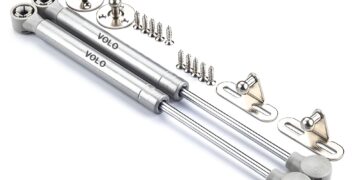When it comes to high-performance vehicles, the choice of radiator material is critical. The radiator plays a crucial role in keeping the engine cool, preventing overheating, and ensuring optimal performance. Among the various materials used in radiators, aluminum has emerged as the preferred choice for high-performance vehicles. This preference is not arbitrary; it is based on the unique properties and benefits that aluminum radiators offer. In this article, we will explore why aluminum radiators are the go-to option for high-performance vehicles, delving into their advantages, performance characteristics, and how they compare to other materials.
The Role of Radiators in High-Performance Vehicles
Before diving into the specifics of aluminum radiators, it is essential to understand the critical role radiators play in high-performance vehicles. These vehicles are designed to deliver exceptional power, speed, and efficiency, which often means their engines operate at much higher temperatures compared to regular vehicles. A radiator’s primary function is to dissipate the heat generated by the engine, maintaining an optimal operating temperature that prevents engine damage and ensures peak performance.
In high-performance vehicles, efficient heat dissipation is paramount. Overheating can lead to engine knocking, loss of power, and even catastrophic engine failure. Therefore, the choice of radiator material can significantly impact the vehicle’s overall performance and longevity.
The Superiority of Aluminum as a Radiator Material
Aluminum radiators have become the preferred choice for high-performance vehicles due to several key reasons:
- Superior Thermal Conductivity Aluminum is known for its excellent thermal conductivity, which means it can transfer heat more efficiently than other materials. This property allows aluminum radiators to dissipate heat faster, keeping the engine cool even under extreme conditions. In high-performance vehicles, where engines generate a significant amount of heat, this efficient heat transfer is crucial for maintaining optimal performance.
- Lightweight Design One of the most significant advantages of aluminum is its lightweight nature. High-performance vehicles prioritize weight reduction to improve speed, agility, and fuel efficiency. Aluminum radiators weigh significantly less than their copper or brass counterparts, contributing to the overall weight reduction of the vehicle. This lightweight characteristic not only enhances the vehicle’s performance but also improves handling and responsiveness.
- Durability and Corrosion Resistance Aluminum radiators are highly durable and resistant to corrosion. Unlike copper and brass, which are prone to corrosion over time, aluminum forms a natural oxide layer that protects it from rust and corrosion. This durability ensures a longer lifespan for aluminum radiators, making them a cost-effective choice for high-performance vehicles. Additionally, the corrosion resistance of aluminum radiators makes them ideal for use in harsh environments, where exposure to moisture and road salts is common.
- Efficient Heat Dissipation Aluminum radiators often feature larger surface areas with more fins, which increases their ability to dissipate heat. The design of aluminum radiators typically allows for more efficient airflow, enhancing the cooling process. This efficient heat dissipation is particularly beneficial in high-performance vehicles, where every degree of temperature reduction can make a difference in engine performance.
- Ease of Manufacturing and Customization Aluminum is a versatile material that is easy to work with, making it ideal for manufacturing radiators with custom designs. High-performance vehicles often require radiators with specific dimensions or features to fit unique engine configurations. The ease of manufacturing and customization with aluminum allows for the production of radiators that meet the precise requirements of high-performance vehicles, ensuring a perfect fit and optimal cooling efficiency.
- Improved Aesthetics In addition to their functional benefits, aluminum radiators also offer aesthetic advantages. The sleek and polished appearance of aluminum radiators adds to the overall visual appeal of high-performance vehicles. For car enthusiasts who take pride in the appearance of their vehicles, an aluminum radiator can be a desirable upgrade that enhances both performance and aesthetics.
Aluminum vs. Other Radiator Materials
To fully appreciate the advantages of aluminum radiators, it is essential to compare them with other common radiator materials, such as copper and brass.
- Copper Radiators Copper has traditionally been used in radiators due to its excellent thermal conductivity. However, copper radiators are heavier than aluminum radiators, which can be a disadvantage in high-performance vehicles where weight reduction is crucial. Additionally, copper is more susceptible to corrosion, which can reduce the radiator’s lifespan and effectiveness over time. While copper radiators may offer good heat transfer, their weight and durability limitations make them less ideal for high-performance applications.
- Brass Radiators Brass is another material commonly used in radiators, particularly in older vehicles. Like copper, brass offers good thermal conductivity but is heavier and more prone to corrosion than aluminum. Brass radiators are also less efficient in terms of heat dissipation compared to modern aluminum designs. The higher weight and lower efficiency of brass radiators make them less suitable for high-performance vehicles.
- Plastic-Aluminum Radiators Some radiators use a combination of plastic tanks with aluminum cores. While these radiators offer some weight savings and corrosion resistance, they do not provide the same level of durability and heat dissipation as fully aluminum radiators. The plastic components can become brittle over time, leading to potential leaks and reduced performance. In high-performance vehicles, where reliability is paramount, fully aluminum radiators are often the preferred choice.
Real-World Applications and Success Stories
The advantages of aluminum radiators are not just theoretical; they are proven in real-world applications. Many high-performance vehicles, from sports cars to racing vehicles, use aluminum radiators to achieve optimal cooling performance. For example, in motorsports, where engines are pushed to their limits, aluminum radiators are the standard choice due to their ability to handle extreme temperatures and maintain consistent performance. You can also consider buying oil coolers.
Automotive enthusiasts who modify their vehicles for increased power and performance also turn to aluminum radiators. Whether it’s a turbocharged engine, a supercharged V8, or a high-revving naturally aspirated engine, aluminum radiators provide the necessary cooling capacity to support these performance upgrades.
Conclusion
In conclusion, aluminum radiators have become the preferred choice for high-performance vehicles due to their superior thermal conductivity, lightweight design, durability, and corrosion resistance. When compared to other materials like copper and brass, aluminum offers significant advantages that make it ideal for the demands of high-performance engines. Whether in racing applications, modified vehicles, or sports cars, aluminum radiators deliver the cooling efficiency needed to maintain peak engine performance and prevent overheating.
As high-performance vehicles continue to evolve, the importance of efficient cooling systems cannot be overstated. Aluminum radiators will likely remain the top choice for enthusiasts and manufacturers alike, ensuring that these vehicles perform at their best, even under the most demanding conditions. For anyone looking to enhance their vehicle’s cooling system, upgrading to an aluminum radiator is a decision that offers both immediate and long-term benefits.














